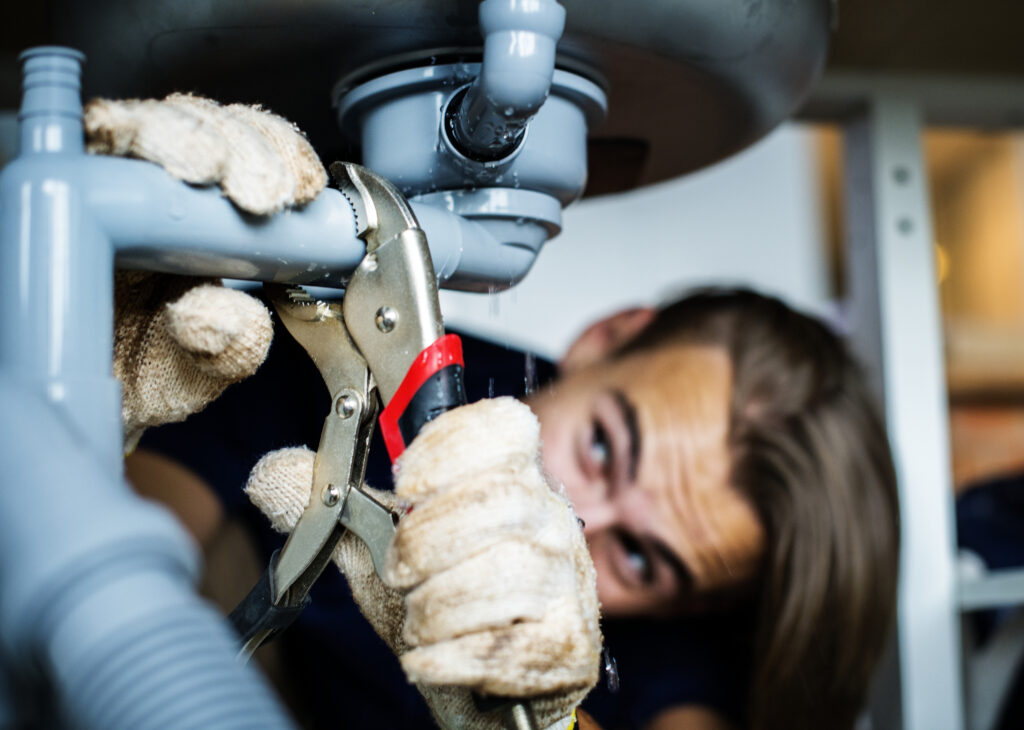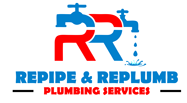
Understanding the Need for Re-piping
Knowing when to repipe is crucial for maintaining your home’s plumbing. Several signs indicate it’s time for this critical upgrade.
Here’s what to watch for:
- Low water pressure throughout the home
- Persistent leaks or frequent plumbing repairs
- Rust-colored or discolored water
- Odd-tasting water
- Noticeable corrosion on pipes
Ignoring these signs can lead to serious problems. Delaying repiping can cause water damage to your home and potential health risks from contaminated water.
Additionally, neglected pipes may burst, leading to costly emergency repairs. Addressing repiping needs early can prevent such issues, safeguarding your home’s health and value.
Repiping your home is a significant undertaking. It’s a process that involves replacing old, worn-out pipes with new ones.
But why is it necessary?
Over time, pipes can corrode, leak, or simply become outdated. This can lead to a host of plumbing issues, from low water pressure to discolored water.
In this essential guide to repiping your home, we’ll delve into the details. We’ll explore when repiping is needed, the types of pipes available, and the repiping process itself.
We’ll also provide tips on finding reliable plumbing services for the job. Whether you’re a homeowner, a property manager, or a DIY enthusiast, this guide is designed to help you navigate the repiping process with confidence.
So, let’s dive in and demystify the world of repiping.
Types of Pipes: Pros and Cons
Choosing the right type of pipe is vital for a successful repiping project. Copper pipes are a popular option due to their durability and resistance to corrosion. They last a long time and are suitable for both hot and cold water systems. However, copper pipes tend to be costly, and their installation requires specialized skills. Crosslinked polyethylene (PEX) is a high – temperature,flexible, polymer pipe.PEX pipes provide a flexible and affordable alternative. Their flexibility allows for easier installation, even in tight spaces. PEX-A is also resistant to scale and chlorine, making it suitable for various water types. PEX-A pipe is the most burst resistant pipe on the market. It can withstand freezing temperatures and ice. PVC pipes are lightweight and easy to install. They resist corrosion and are good for drain lines and cold water systems. But, PVC pipes are not suitable for hot water applications because they can degrade with heat. Also, some consider them less durable than metal pipes.Choosing the right pipe depends on your specific needs and budget. Make sure to consult with your plumber when deciding the best option for your home.
The Repiping Process Explained
Repiping your home begins with a thorough initial inspection. A licensed plumber examines your existing plumbing system to identify areas needing replacement. This step helps determine the extent of the project and guides material selection. Inspection findings also inform cost estimates and timelines, ensuring transparency from the start.
The installation phase follows, involving precise planning and execution. Your plumber removes old pipes and installs new ones, maintaining minimal disruption to your daily routine. It’s essential to clear pathways and remove obstacles to allow smooth access for the plumbing team. Skilled professionals work efficiently to connect pipes securely and safely.
After installation, a final inspection ensures the system functions flawlessly. This stage includes testing for leaks and checking water pressure. The plumber verifies all connections and aligns the work with local codes. A comprehensive quality assurance process guarantees your new plumbing system operates optimally. Proper inspection prevents future complications, safeguarding your investment.
Preparing Your Home for Repiping
Getting your home ready for repiping can reduce stress and help the process run smoothly. Start by clearing access to plumbing areas, like under sinks and behind appliances. If possible Ensure children and pets are kept away from work areas. Confirm that all smoke detectors and alarms are functioning properly. For added peace of mind, coordinate with your plumber regarding any additional safety protocols they recommend. Taking these precautions will protect everyone involved.
Local Labor Costs
Labor costs vary based on your location. For instance, the average cost to repipe a house in Houston, Texas, might differ from costs in other parts of the country. It’s essential to get quotes from local repipe specialists or repiping plumbers for accurate estimates.
Maintaining Your New Plumbing System
After repiping, proper maintenance is crucial for your plumbing system’s performance and longevity. Regular checks for leaks and corrosion can help you detect issues early. This proactive approach prevents minor problems from becoming major headaches.
To ensure your pipes last as long as possible, follow these maintenance tips:
- Schedule periodic inspections by a professional plumber.
- Insulate exposed pipes, especially in cold climates.
- Avoid using chemical drain cleaners; opt for natural remedies instead.
By adhering to these guidelines, you can maximize your plumbing system’s lifespan and enjoy uninterrupted water service. Proper care helps maintain optimal performance and efficiency.
Hiring the Right Plumbing Professional
Finding a qualified plumber is essential to the success of your repiping project. Start by researching “plumbing repipe near me” to gather a list of local re-pipe professionals. Check online reviews and ratings for insight into their reputation and reliability. Referrals from friends or neighbors can also guide you to trustworthy options. Repipe and Replumb are your local repipe specialists. We are located in Houston Texas. We serve the greater Houston and surrounding areas. If you live in Houston, Webster, Pasadena, Katy, League City, Missouri City, Clear Lake, Baytown, Stafford, Sugarland, Humble, Friendswood, League City, Cypress, Dickinson, Kingwood call us for your free onsite repipe plumbing estimate.Once you have candidates, prepare questions to ensure you choose the best. Inquire about their experience with repipe plumbing projects and request references. Ask about their licensing, insurance, and warranties offered. Discuss their approach to pipe installation and get detailed estimates. Evaluating responses helps in selecting a competent professional to safeguard your home.
Cost, Financing, and Insurance
Understanding the financial aspect of repiping is essential. Costs vary based on factors like the pipe material and the size of your home. On average, repiping a home can range from a few thousand to tens of thousands of dollars. Getting detailed quotes from multiple contractors will help ensure a fair price.
Financing options can ease the burden of repiping expenses. Consider personal loans or home equity lines of credit. Some plumbing companies offer payment plans to spread the cost. Additionally, check your insurance policy. It might cover damages related to plumbing failures, which could lower out-of-pocket costs. Always review all financing details carefully.
The Benefits of Repiping Your Home
Repiping your home offers significant benefits. First and foremost, it improves water quality by removing contaminants from corroded pipes. With new pipes, you’ll notice a consistent and stronger water pressure throughout your home. This makes daily tasks like showering and doing dishes more pleasant and efficient.
Beyond enhancing water quality, repiping can significantly boost your property’s value. New plumbing is an attractive feature for potential buyers, reassuring them about the home’s condition. Moreover, repiping can prevent costly water damage, which adds another layer of financial security. Consider these benefits when planning your home improvements.
FAQs About Repiping
When should a house be repiped?
Repiping is typically necessary if your home has persistent leaks, discolored water, or low pressure. Age and type of existing pipes are also factors. A professional inspection can help determine if repiping is needed.
How much does repiping cost?
The cost varies based on factors like house size and pipe material. On average, repiping can range between $4,000 and $15,000. Get quotes from multiple contractors for a more accurate estimate.
Can repiping be done without damaging walls?
Yes, experienced plumbers use advanced techniques to minimize wall damage. They often access pipes through strategic openings. Repipe and Replumb will cover all Patching and repainting after the repiping process to restore any impacted walls.
How long does repiping take?
Typically, a full replumbing project can take three to seven days. The timeline depends on the home’s size and complexity of the plumbing layout. Coordination with your plumbing team can ensure a smooth process.
Will repiping affect my daily routine?
Repiping may temporarily disrupt your water service, and some areas might be off-limits during work. Clear communication with your plumber helps minimize inconvenience. Planning ahead can reduce disruptions to your routine.
Conclusion
Repiping your home can be a complex yet rewarding process. It improves water quality and increases property value. By selecting the right professional and preparing adequately, you can ensure a smooth transition to a new, efficient plumbing system. Remember to conduct regular maintenance to maximize your investment.
Contact Us for More Information
